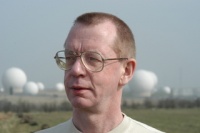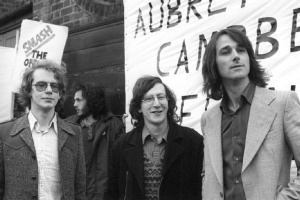Duncan Campbell
( journalist, author) | |||||||||||||||||||||||
|---|---|---|---|---|---|---|---|---|---|---|---|---|---|---|---|---|---|---|---|---|---|---|---|
 At RAF Menwith Hill, eavesdropping base | |||||||||||||||||||||||
| Born | September 1952 Glasgow, Scotland, United Kingdom | ||||||||||||||||||||||
| Nationality | British | ||||||||||||||||||||||
| Alma mater | • Oxford University • University of Sussex | ||||||||||||||||||||||
| Exposed | • • | ||||||||||||||||||||||
| Member of | International Consortium of Investigative Journalists | ||||||||||||||||||||||
Celebrated investigative journalist.
| |||||||||||||||||||||||
Duncan Campbell is a British freelance investigative journalist, author and television producer, who revealed GCHQ and the Echelon program in the course of his journalism into topics including government secrecy, corporate crime and medical fraud.[1]
Campbell now also works and is recognised as a forensic expert witness on computers and communications data. He has provided specialist testimony in over a hundred criminal and civil cases and has given evidence to the House of Commons and the European Parliament on surveillance legislation.[2]
Contents
Background
Campbell was born in Glasgow and educated in Dundee, Scotland. He graduated from Oxford University in physics in 1973, moving on to study Operations Research at the University of Sussex, which took him to Brighton. There he started writing as a contributor to the science and technology weekly, New Scientist and investigating for a local “alternative” newspaper, Brighton Voice.
Career
Since 1975 he has specialised in the subjects of intelligence and security services, defence, policing, civil liberties and, latterly, computer forensics. From 1978-91, he was a staff writer at the New Statesman and associate editor (Investigations) from 1988-91.
In 1977-78, Duncan Campbell was prosecuted under the Official Secrets Act in the ABC Trial and made the series Secret Society for the BBC in 1987. Before the programme ran, however, the BBC became nervous about the nature of its content and approached the Thatcher government for advice. Their reaction was to raid the BBC’s Scottish headquarters and then Campbell’s home. Special Branch seized the film in what became known as the Zircon affair.
GCHQ
Duncan Campbell has exposed state snooping for over four decades. In 1976, he revealed for the first time the existence of GCHQ (Government Communications Headquarters) in a piece for Time Out magazine called, "The Eavesdroppers". This led to his arrest in February 1977 with Crispin Aubrey and John Berry, and their being charged under Sections 1 and 2 of the Official Secrets Act 1911 (Berry was charged with "communicating classified information to unauthorised persons", and Campbell and Aubrey with "unauthorised receipt of classified information").[3]
ABC Trial
On 5 September 1978, the resulting ABC Trial opened at the Old Bailey in front of Mr Justice Willis but was stopped two weeks later after the jury foreman was exposed as a former SAS officer. Three weeks after the second trial opened in front of Mr Justice Mars-Jones on 3 October 1978, all Section 1 charges were dropped. On 17 November 1978, Crispin Aubrey, John Berry and Duncan Campbell were found guilty and received non-custodial sentences. The ABC Trial was described by defence witness Ewen Carmichael as "a farcical romp of political stupidity, as prosecution witnesses, testifying anonymously under letters of the alphabet – in particular witness B, Colonel Hugh Johnstone, head of Signals Intelligence – were identified to the public outside the courts, and later by NUJ members at their annual conference." To Crispin Aubrey, the prosecution's attempts at secrecy were "the security services trying to cloak their witnesses in anonymous letters and make the whole affair appear more sinister."
In 1989, Section 2 was amended to make it an offence to divulge information only in relation to six specific categories.
Journalism
After the trial, Duncan Campbell joined the New Statesman magazine. During his 15 years, he investigated Britain’s secret phone-tapping centres, corruption in GCHQ, secret war time plans to suspend civil liberties, and the top secret global surveillance programme, Echelon.
In 1982, Campbell published "War Plan UK — the Truth about Civil Defence in Britain", which revealed and discussed — often for the first time — the inadequacy and futility of the British government's preparations in the event of nuclear war.[4]
In 1988, Campbell revealed the existence of the Echelon surveillance program.[5]
In 1997, the Centre for Public Integrity in Washington D.C. founded the International Consortium of Investigative Journalists. The group was designed to be a cross border investigative outfit “focusing on issues that do not stop at national frontiers.” Campbell was a founder member of the ICIJ.
Recently, he has produced reports based on the Snowden files for the Independent, including how the British Embassy in Berlin was being used as a covert listening station.
In 2013, Campbell spoke at an event called Brighton CryptoFestival that aimed to raise awareness about government mass surveillance and the availability of countermeasures.[6]
In November 2017, marking the 40th anniversary of the arrests of the ABC three, John Berry and Duncan Campbell took part in a panel discussion with Statewatch Director Tony Bunyan and Sarah Kavanagh, NUJ Senior Campaigns and communications officer, looking at the events from those involved in 1977 and considering its legacy today. It was organised by Aubrey’s family as part of the Crispin Aubrey Legacy Fund set up to support aspiring journalists and in conjunction with the University of West of England’s Film and Journalism Department and Bristol Festival of Ideas.[7]
Documents by Duncan Campbell
References
- ↑ "Duncan Campbell – Biography"
- ↑ "Report to the Director General for Research of the European Parliament (Scientific and Technical Options Assessment programme office) on the development of surveillance technology and risk of abuse of economic information"
- ↑ "GCHQ and Me: My Life Unmasking British Eavesdroppers"
- ↑ "War Plan UK — the Truth about Civil Defence in Britain"
- ↑ "Duncan Campbell, investigative journalist and forensic expert"
- ↑ "Brighton CryptoFestival 2013"
- ↑ "The ABC Secrecy Trial – 40 Years On"
